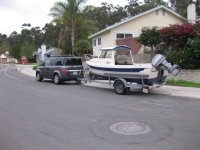- Joined
- Oct 23, 2003
- Messages
- 2,870
- Reaction score
- 10
- Location
- Port Angeles
- C Dory Year
- 1995
- C Dory Model
- 25 Cruise Ship
I just towed a 16 Angler from San Diego to the SF Bay Area with my Honda Element - 2010 AWD w/auto. My personal opinion - the car is easily up to the task, but if doing it regularly I'd invest in surge brakes.

First off, a disclaimer - in the US, the Honda Element is rated at 1500 lbs. max, with a 150 lb. tongue weight max. This load is likely slightly over that - I've estimated by 100-200 pounds, in my case. Yes, I'm well aware of all the arguments...warranty, liability, etc. So, if this is enough to stop you from considering this, just stop reading now. Otherwise...read on for my rationalization.
At the risk of stating the obvious...each 16 is going to be different, depending on many factors - so don't take my weight estimate as anything other than a single data point. Basically, I used the factory published weight ratings for the hull, engine and trailer, 50 lbs. for the battery, and another 80 lbs. for fuel. No gear on board the boat.
RE the max Honda tow rating of 1500 pounds - it's interesting to note, that this is only in the US. When sold elsewhere, the identical vehicle is dual rated - depending on trailer brakes. 1500 without, 3500 with.
The leading theory for this different rating for identical vehicles - trailer brake laws in non-US countries don't vary as they do in the US, where different state laws apply. For safety's sake, Honda has likely determined that towing over 1500 lbs. necessitates trailer brakes - something that is enforced by law in countries with the higher ratings.
Regardless, it's obvious after towing the boat there is no power or stability concern - and with trailer brakes, it could tow even more. Suspension is certainly up to the task, with ride being near normal - and as can be seen above, there is minimal sag from the tongue weight. Perhaps 1-2 inches.
I had zero problem holding freeway speeds. Even heading up the Grapevine from LA, the car easily held 55MPH at roughly half throttle. Brief acceleration to 70 when passing slow trucks on I-5, was brisk and uneventful. Some excessive hunting of gears in the transmission occurred when heading through hilly areas, but that was easily resolved by disengaging the overdrive. Mileage certainly took a hit, but not terribly so. Typical for me on this vehicle is 24-25MPG. With the cruise set at 62MPH, I was getting over 18MPG on relatively flat terrain.
RE the brakes - with this load slightly over maximum, you could certainly tell the boat was back there. Still, I tried a couple heavy stops under controlled conditions, and didn't notice any signs of the boat pushing the vehicle around. Everything was easily controllable, it just took slightly longer than is typical unloaded. Still, were I planning on using this towing combination routinely, surge brakes would certainly provide some additional peace of mind.

First off, a disclaimer - in the US, the Honda Element is rated at 1500 lbs. max, with a 150 lb. tongue weight max. This load is likely slightly over that - I've estimated by 100-200 pounds, in my case. Yes, I'm well aware of all the arguments...warranty, liability, etc. So, if this is enough to stop you from considering this, just stop reading now. Otherwise...read on for my rationalization.
At the risk of stating the obvious...each 16 is going to be different, depending on many factors - so don't take my weight estimate as anything other than a single data point. Basically, I used the factory published weight ratings for the hull, engine and trailer, 50 lbs. for the battery, and another 80 lbs. for fuel. No gear on board the boat.
RE the max Honda tow rating of 1500 pounds - it's interesting to note, that this is only in the US. When sold elsewhere, the identical vehicle is dual rated - depending on trailer brakes. 1500 without, 3500 with.
The leading theory for this different rating for identical vehicles - trailer brake laws in non-US countries don't vary as they do in the US, where different state laws apply. For safety's sake, Honda has likely determined that towing over 1500 lbs. necessitates trailer brakes - something that is enforced by law in countries with the higher ratings.
Regardless, it's obvious after towing the boat there is no power or stability concern - and with trailer brakes, it could tow even more. Suspension is certainly up to the task, with ride being near normal - and as can be seen above, there is minimal sag from the tongue weight. Perhaps 1-2 inches.
I had zero problem holding freeway speeds. Even heading up the Grapevine from LA, the car easily held 55MPH at roughly half throttle. Brief acceleration to 70 when passing slow trucks on I-5, was brisk and uneventful. Some excessive hunting of gears in the transmission occurred when heading through hilly areas, but that was easily resolved by disengaging the overdrive. Mileage certainly took a hit, but not terribly so. Typical for me on this vehicle is 24-25MPG. With the cruise set at 62MPH, I was getting over 18MPG on relatively flat terrain.
RE the brakes - with this load slightly over maximum, you could certainly tell the boat was back there. Still, I tried a couple heavy stops under controlled conditions, and didn't notice any signs of the boat pushing the vehicle around. Everything was easily controllable, it just took slightly longer than is typical unloaded. Still, were I planning on using this towing combination routinely, surge brakes would certainly provide some additional peace of mind.

